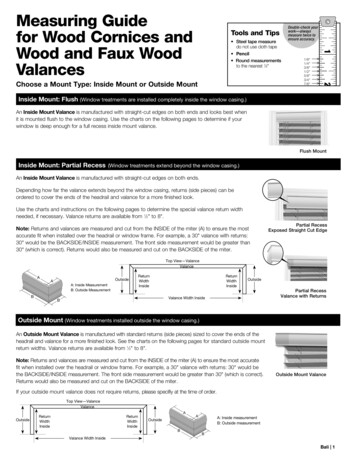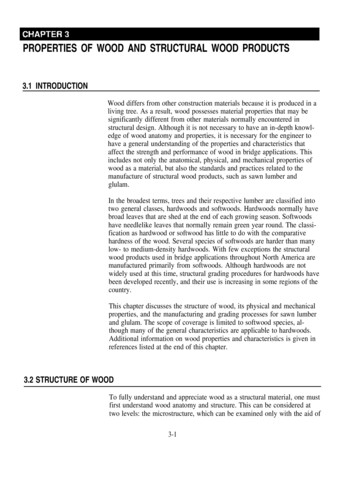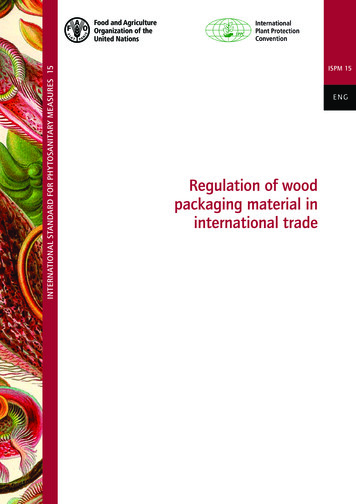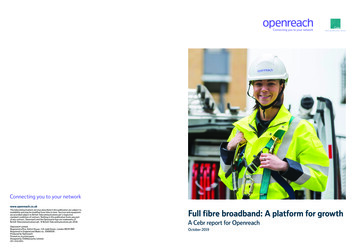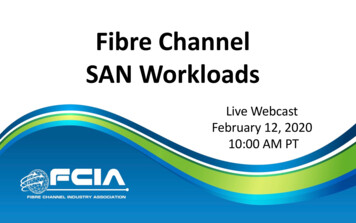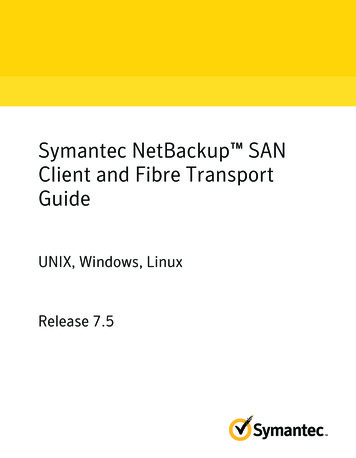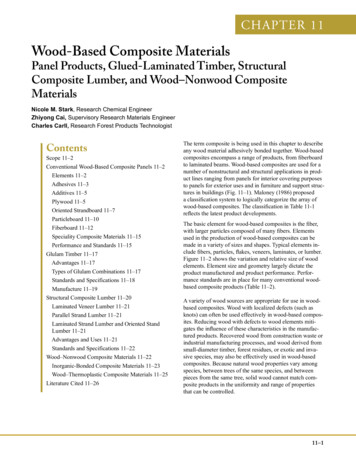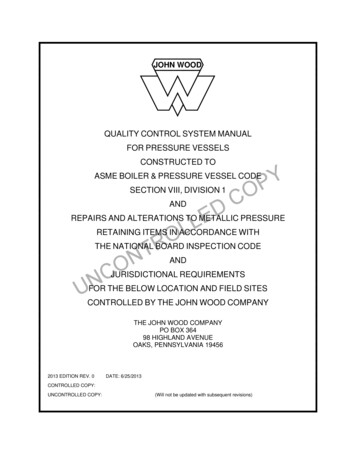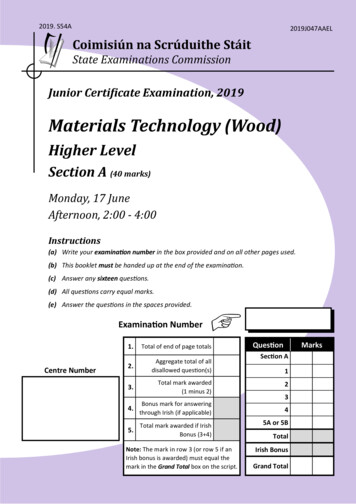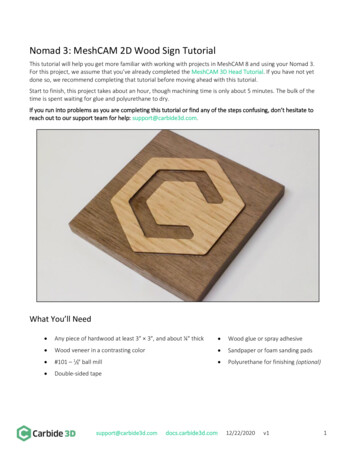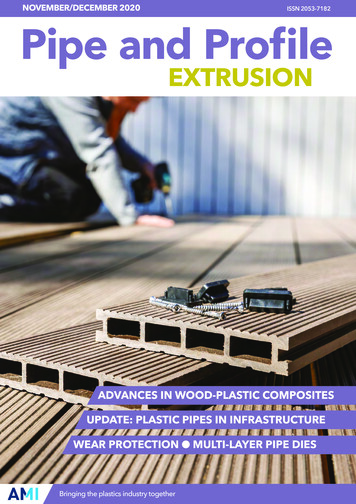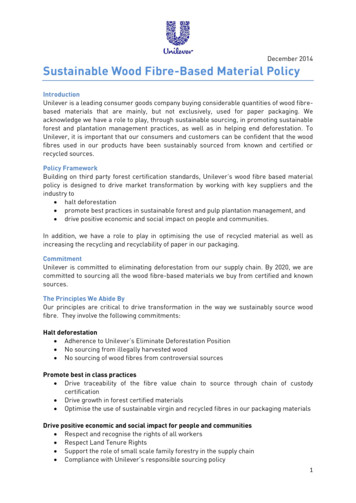
Transcription
December 2014Sustainable Wood Fibre-Based Material PolicyIntroductionUnilever is a leading consumer goods company buying considerable quantities of wood fibrebased materials that are mainly, but not exclusively, used for paper packaging. Weacknowledge we have a role to play, through sustainable sourcing, in promoting sustainableforest and plantation management practices, as well as in helping end deforestation. ToUnilever, it is important that our consumers and customers can be confident that the woodfibres used in our products have been sustainably sourced from known and certified orrecycled sources.Policy FrameworkBuilding on third party forest certification standards, Unilever’s wood fibre based materialpolicy is designed to drive market transformation by working with key suppliers and theindustry to halt deforestation promote best practices in sustainable forest and pulp plantation management, and drive positive economic and social impact on people and communities.In addition, we have a role to play in optimising the use of recycled material as well asincreasing the recycling and recyclability of paper in our packaging.CommitmentUnilever is committed to eliminating deforestation from our supply chain. By 2020, we arecommitted to sourcing all the wood fibre-based materials we buy from certified and knownsources.The Principles We Abide ByOur principles are critical to drive transformation in the way we sustainably source woodfibre. They involve the following commitments:Halt deforestation Adherence to Unilever’s Eliminate Deforestation Position No sourcing from illegally harvested wood No sourcing of wood fibres from controversial sourcesPromote best in class practices Drive traceability of the fibre value chain to source through chain of custodycertification Drive growth in forest certified materials Optimise the use of sustainable virgin and recycled fibres in our packaging materialsDrive positive economic and social impact for people and communities Respect and recognise the rights of all workers Respect Land Tenure Rights Support the role of small scale family forestry in the supply chain Compliance with Unilever’s responsible sourcing policy1
December 2014Milestones From today, we will work with suppliers who show commitment and intent to adhereto the principles in this policy By the end of 2015 100% of all of our paper and board packaging will be sourcedsustainably (recycled, or certified virgin) By 2019 we will accept recycled fibre products only when they come from certifiedsources (with a full chain of custody) By 2020 at the latest, Unilever will source wood fibre-based materials solely fromcertified sources (with a full chain of custody)Milestones for Paper-Based Office MaterialsSustainably sourcing our paper based office materials already forms a part of our UnileverSustainable Living Plan (USLP) commitments. We have adopted the following timetable forroll out: By 2013 all paper-based office materials for our top 21 countries were sourcedsustainably By 2016 this will apply to all countries in Europe and Latin America By 2020 at the latest, all paper-based office materials for all locations will besourced sustainablyMeasurement & ReportingUnilever will be transparent about its progress. This involves working with suppliers tomeasure and report progress, on a yearly basis, the progress we are making towards thegoals outlined above. We use a supplier self-assessment approach verified through aprogramme of regular and independent audits.Time-bound Plans & Working with Suppliers and StakeholdersUnilever will work with its packaging suppliers to develop individual time-bound action plansto deliver a supply chain for certified sustainable wood fibre-based materials. Suppliers must make a time-bound commitment to have their production certified bya Unilever-recognised third party certification scheme When the production chain is chain of custody certified, the share of certified virginfibre or recycled raw material must be gradually increased, according to a timebound commitment, until the level required by this policy is reached.In working with suppliers, NGOs and other industry groups, Unilever will conduct all of itsoperations in accordance with the principles of fair competition and applicable law, includingadherence to Unilever’s Code of Business Principles. In turn, Unilever requires its suppliersto commit to its Responsible Sourcing Policy.2
December 2014ANNEX 1: DEFINITIONSWood Fibre Based Materials:This policy covers wood fibre based materials in the following sourcing groups: packagingmade of wood fibres, point of sale and commercial print materials used in marketingapplications, pallets and office paper products. It will automatically apply to all futurematerial applications containing wood fibre based raw materials. The policy covers all woodfibre-based materials purchased by Unilever directly as well as materials sourced forUnilever by third party manufacturers.Paper & Board Packaging:Our 2015 and 2019 Milestones refer to the paper and board packaging we purchase directly.This includes folding cartons, customer packaging, aseptics, and ice cream sticks, but doesnot include flexible, labels or tea bags.Virgin Wood Fibres:Recycled Fibres:Virgin wood fibre is fibre material that has been extracteddirectly from wood or any solid wood products.Unilever accepts as recycled fibres:- Pre-consumer waste originating from fibre that has beendiverted from the waste stream during the manufacturingprocess and has not been used by the end consumer.Unilever does not consider mill broke from virgin fibres asrecycled material.- Post-consumer waste that has been used for its intendedpurpose by the end users of the product and has beenreclaimed from the waste stream. Unilever does considermill broke from recycled fibres as recycled material.Sourced Sustainably:In accordance with the wood fibre based materials policy, by the end of 2015 100% of our paperand board packaging will be sourced sustainably. The following definitions apply:Virgin Material:Virgin material must come from Unilever-recognised, thirdparty certified sources (see definition below).Recycled Material:During a transition period from 31 December 2014 until 31December 2018, recycled material will be considered assustainable If it fits the definition of ‘recycled fibres’ providedabove- When supplying products under a recycled claim, thesupplier must report the fibre composition in terms of (a)recycled fibres, (b) certified virgin fibres and (c) virginfibres, giving each as a percentage of the total content- The percentage of product content shall be calculated on asix-monthly rolling average3
December 2014Certified Sources:In accordance with the wood fibre-based policy, by the end of 2015 100% of our virgin materialwill come from certified sources, and by 2019 we will require that recycled products are also fullychain of custody certified.Unilever currently accepts products as certified when the following two criteria are met:i.Products are delivered in accordance with FSC or PEFC chain of custody standardsiii.Related documentation such as invoices and delivery notes carry requiredinformation about certificationFor virgin products, Chain of Custody certification is a mechanism for tracking certifiedmaterial from the forest to the final product. It means we can be sure that the wood, woodfibre or non-wood forest produce contained in the product can be traced back to certifiedforests. A forest certification provides reassurance of sustainable forest management atsite. The requirement for certified Chain of Custody covers the complete supply chain: eachstage of manufacturing from wood supply until finished product must be certified.For recycled products, Chain of Custody certification is a mechanism for ensuring that theinitial feedstock in the product is recovered material, and that this fibre is tracked throughthe supply chain to the final product.In this policy, ‘certified sources’ refers to sources that are certified against the third partyverified Forest Stewardship Council (FSC) or Programme for Endorsement of ForestCertification (PEFC) schemes, with full chain of custody. In addition to the requirementsstipulated by these schemes, we require assurance that fibres sourced from countries onthe exception list have not come from controversial sources, particularly in the case of PEFC(see section below). Other schemes may be recognised in the future based on a benchmarkagainst the Unilever Sustainable Agriculture Code.Time-bound Plans:We require our suppliers to put in place time-bound plans to increase the share of certifiedvirgin fibre or recycled raw material in the products they supply to us. Deliveries of productsthat do not include 100% certified fibre will be prioritised in Unilever’s regular complianceaudits. Until it is possible to reach 100% certified fibre, we will pay particular attention toPEFC certified products to ensure that no controversial sources from the exception countrylist (see annex 2) have entered the supply chain. In the case of FSC certified products, thisrisk is mitigated by their standard on controlled wood.Exception Countries:Sources of virgin wood fibre shall be known, free of corruption and compliant with applicablelegal requirements. Particular attention has to be given to wood fibres sourced from acountry of origin on the Wood Fibre-Based Materials Exception Country list. These countrieshave been identified by various scientific institutions and NGOs as requiring special attentionfor one or more of the following activities related to wood product harvesting:i.Illegal loggingii.Forest Conversioniii.Civil and Traditional Rights Violationsiv.Threatened High Conservation Values4
December 2014Deliveries from these countries will be prioritised in Unilever’s regular compliance audits.Suppliers will be required to have all documentation related to risk assessment immediatelyavailable. The Exception Country list is in Annex 2.Risk AssessmentsRisk assessments are a means to provide proof for compliant virgin material sources anddetermine potential risk for wood fibre from unacceptable sources entering the supplychain. Risk assessments are based on country of origin, available certifications, timberspecies, supply chain structure and other available information.When risks are identified, measures shall be taken to work with suppliers to eliminatecontroversial sources of virgin fibre. A due diligence system that meets, at minimum the EUTimber Regulation Due Diligence or US Lacey Act requirement is required.Halt DeforestationUnilever Eliminate Deforestation position LINK TO BE ADDEDDrive positive economic and social impact on people and communities:Universal Declaration of Human Rights lever Supplier Code es/suppliercode/iThe following standards apply:FSC:STD-40-003: Standard for Multi-site Certification of Chain of Custody OperationsSTD-40-004: FSC Standard for Chain-of-Custody EvaluationSTD-40-004a: FSC Product ClassificationSTD-40-004b: FSC Species TerminologySTD-40-005: FSC Standard for Company Evaluation of FSC Controlled WoodSTD-40-010: FSC Controlled Wood Standard for Forest Management EnterprisesSTD-40-007: FSC Standard for Use of Reclaimed Material in FSC Product Groups and FSC-certified ProjectsSTD-50-001: Requirements for the use of FSC trademarks by Certificate HoldersPEFC:ST 2002:2010: Chain of Custody of Forest-Based Products – RequirementsGD 2001:2011: Chain of Custody of Forest-Based Products – Guidance for UseST 2001:2008: Logo Usage Rules5
against the Unilever Sustainable Agriculture Code. Time-bound Plans: We require our suppliers to put in place time-bound plans to increase the share of certified virgin fibre or recycled raw material
